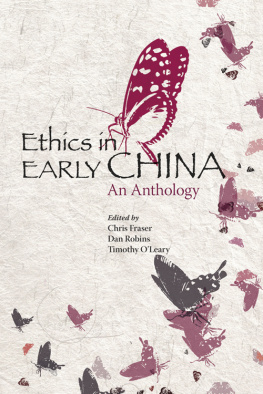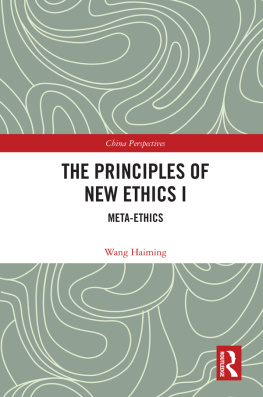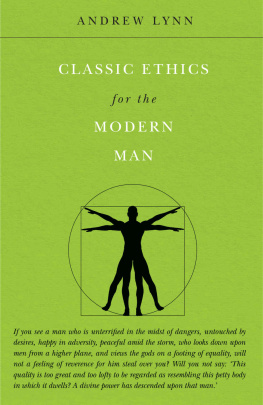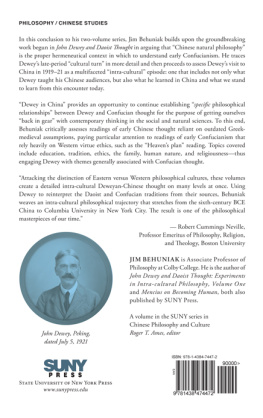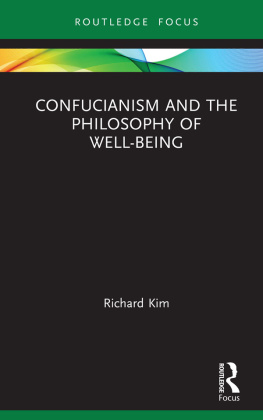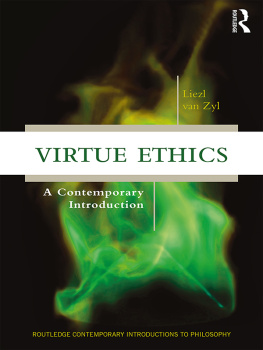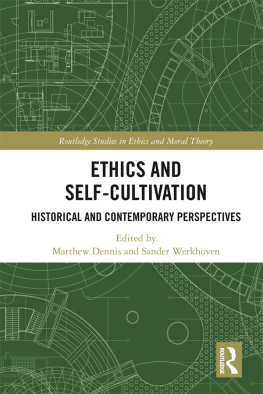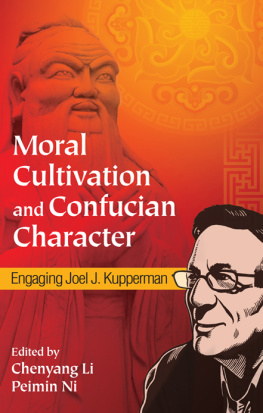Early Chinese ethics has attracted increasing scholarly and social attention in recent years, as the virtue ethics movement in Western philosophy sparked renewed interest in Confucianism and Daoism. Meanwhile, intellectuals and social commentators throughout greater China have looked to the Chinese ethical tradition for resources to evaluate the role of traditional cultural values in the contemporary world. Publications on early Chinese ethics have tended to focus uncritical attention toward Confucianism, while neglecting Daoism, Mohism, and shared features of Chinese moral psychology. This book aims to rectify this imbalance with provocative interpretations of classical ethical theories including widely neglected views of the Mohists and newly reconstructed accounts of the embodied virtue tradition, which ties ethics to physical cultivation. The volume also addresses the broader question of the value of comparative philosophy generally and of studying early Chinese ethics in particular.
Contributors include Roger T. Ames, Stephen C. Angle, Jiwei Ci, Chris Fraser, Jane Geaney, William Haines, Chad Hansen, Manyul Im, Philip J. Ivanhoe, Franklin Perkins, Lisa Raphals, Dan Robins, Henry Rosemont, Jr., David Wong, and Lee Yearley.
Chris Fraser and Timothy OLeary are associate professors of philosophy at the University of Hong Kong. Dan Robins is associate professor of philosophy at the Richard Stockton College of New Jersey.
Through beautiful, nuanced studies of the early texts, the authors provide a powerful portrait of early Chinese ethical thought in all of its philosophical sophistication. These outstanding essays should play a crucial role in bringing Chinese discussions of ethics into the larger conversations of philosophy in general.
Michael Puett, Professor of Chinese History, Harvard University, author of To Become a God: Cosmology, Sacrifice, and Self-Divinization in Early China
The cosmopolitan, multicultural experience of modernity increasingly calls upon us to reflectively examine our traditions. Ethics in Early China is a first-rate collection of new writings by top scholars on the classical Chinese traditions, Confucian and Daoist, which are part of the blood and bones of many modern sensibilities, not only of East Asians but of the many others who are part of a diaspora and heirs and heiresses to these traditions. This book is a wonderful resource for any teacher of comparative philosophy and a must-have for any collection on classical Chinese ethics.
Owen Flanagan, James B. Duke Professor of Philosophy, Duke University
Ethics in Early China
For
Chad Hensen
colleague, teacher, friend
Ethics in Early China
An Anthology
Edited by
Chris Fraser, Dan Robins, and Timothy OLeary

This publication was generously supported by a subvention from the Department of Philosophy, University of Hong Kong.
Hong Kong University Press
14/F Hing Wai Centre
7 Tin Wan Praya Road
Aberdeen
Hong Kong
www.hkupress.org
Hong Kong University Press 2011
ISBN 978-988-8028-93-1 (Paperback)
ISBN 978-988-220-936-7 (eBook)
All rights reserved. No portion of this publication may be reproduced or transmitted in any form or by any means, electronic or mechanical, including photocopy, recording, or any information storage or retrieval system, without prior permission in writing from the publisher.
British Library Cataloguing-in-Publication Data
A catalogue record for this book is available from the British Library.
First printing 2011
First eBook 2011
10 9 8 7 6 5 4 3 2 1
Foreword: The Professors D , or the Many-Sided Chad Hansen
Donald J. Munro
Chad Hansen was a graduate student at Michigan and I was a junior faculty member when I first started making judgments about some of our analytic philosophers. They made useful and intriguing contributions to philosophy. They made me especially aware of the importance of precise argument, consistency, clarity of meaning of the terms we employ, and many issues about language. At the same time, their definition of philosophy was narrow, unlike anything I had studied among the Platonists in the early period or among the American pragmatists in the modern United States. Chad and I shared an approval of those in the James, Peirce, and Dewey tradition. The analytic colleagues were quick to dismiss a colleagues words as not doing philosophy. Disinterest in the findings of other fields relevant to some enduring philosophical questions was one of their traits. They also seemed not to care about the social or cultural context in which people formulated positions. Chad wrote a wonderful Ph.D. dissertation, which drew him gradually into the analytic approach. However, he has remained something of a classical pragmatist (to which, add some Rawls). Among the people who influenced him were Stich and Sklar at Michigan, plus, later on, Chomsky, Montague, and Quine elsewhere. There was much positive about this dissertation-writing phase, as Hansen had begun exploring the logical side of meaning. But, my goodness, unlike some of his teachers, how he has manifested charity in listening to the views of others, how he has embedded his knowledge of other fields into his own philosophical work, and what a deep understanding he has for the cultural variations among Chinese and Western philosophers! One would hardly recognize him among some of those who long ago helped train the many-sided Professor Hansen.
He is quick to identify the strengths in parts of positions with which he otherwise disagrees, and this is not all charity. The authors of several of the chapters in this collection will recall his balanced and favorable comments on parts of them after they were delivered as papers at the conference in Hansens honor at the University of Hong Kong in May 2008. In my own case, I am a non-traditional utilitarian. Hansen is nothing of the kind. I once talked to him about my views as a two-realm utilitarian. One of these realms is all humans (the subject of public morality), where worth is derived from the law. The other is close relatives, neighbors, and communities with which a person bonds (private morality), where worth for these individuals comes from the degree of my emotional commitment to them. Traditional utilitarians would say that each human is of equal worth, to be counted as one unit in measuring the greatest happiness. On the contrary, I would treat the targets of private morality as having greater worth than the others. The analytic Hansen would not approve, and say that the rules of public morality should include each person taking care of those closest to him or her, an efficient single-tier way to achieve utilitarian general happiness. But another side of Hansen was perfectly willing to go beyond rule utilitarianism. He admitted the emotional change that colored his commitment to his own children when they appeared on the scene, and set them off from other people. In my view, this was an acknowledgement of differential worth. In brief, being concerned with a workable ethics, I care about motivation. I am more motivated to act from an emotional (private) bond than I am from an abstract rule.
In contrast to my utilitarianism, Hansen has an ethical perspective that derives from his structural systems view of what our minds construct. Systems implies that we identify interconnected parts. By examining these systems, we can understand how we perceive and what we value. I think that Hansen likes the concept of do in classical Chinese Daoism partly because it describes an exemplary structural system. It is natural when it works smoothly; in change, there will be an easy flow. These are values to be prized. As Chris Fraser has noted, Hansen likes the value of toleration, also inspired by Zhungzs
Next page
